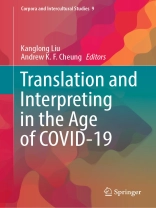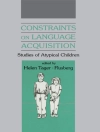This book presents the latest developments in translation and interpreting (T&I), which has been at the forefront to face the challenges brought by COVID-19. The contributions in the book contain both quantitative and qualitative empirical studies as well as personal accounts of the impact and opportunities T&I has faced in the global pandemic, covering topics including metaphor translation, delivery of and access to T&I services during COVID-19, renewed perspectives on T&I practice and profession, and technological applications in the T&I classroom. The various themes in the book, through examining the role and many facets of T&I against the backdrop of COVID-19, have demonstrated that T&I as a vital means of intercultural communication is assuming immense importance at a time of uncertainties and disruptions.
As one of the books addressing crucial issues of T&I at a time of global crisis, this edited book is of interest to many T&I professionals, researchers, teachers, and students who have been impacted by the pandemic and yet showed a continued interest in T&I and its future emerging practice in the post-pandemic era.Daftar Isi
Translation and Interpreting in the Age of COVID-19: Challenges and Opportunities.- Metaphor Translation as Reframing: Chinese versus Western Stance Mediation in COVID-19 News Reports.- COVID-19 Translated: An Account of the Translation and Multilingual Practices Enacted in Hong Kong’s Linguistic Landscape during the Pandemic Crisis Communication.- What is Chinese? A Case Study of the Chinese Translation of Government Guidance and Regulations in Relation to COVID-19 in the UK.- COVID-19 MT Evaluator: A Platform for the Evaluation of Machine Translation of Public Health Information Related to COVID-19.- Remote Simultaneous Interpreting from Home or Hub: Accuracy of Numbers from English into Mandarin Chinese.- Remote Simultaneous Interpreting and COVID-19: Conference Interpreters’ Perspective.- Reconceptualising Interpreting at the United Nations.- Humanitarian Interpreting in the Age of COVID-19.- Teamwork in the Virtual Booth – Conference Interpreters’ Experiences with RSI Platforms.- COVID-19 and the Configuration of Materiality in Remote Interpreting: Is Technology Biting Back?.- Hybrid Mode of Teaching in the Translation Classroom: Students’ Perceptions and Experiences.- Unmasking the In-person Classroom: Cultural Advantages of Online Learning in the Chinese Context.- Teaching and Learning Translation and Interpreting in the Time of COVID-19: Preparation, Class Content and Activities and Assessment (The Slovak Case).- Regrouping during COVID: Attitudes toward In-person and Remote Instruction in a Graduate Studies Program.- Teaching Interpreting in the Time of COVID: Exploring the Feasibility of Using Gather.- Use of Computer-Assisted Interpreting Tools in Teaching and Interpreting during COVID-19.
Tentang Penulis
Kanglong Liu is Assistant Professor of Department of Chinese and Bilingual Studies of The Hong Kong Polytechnic University. His research interests include corpus-based translation studies, language and translation pedagogy, and
Hongloumeng translation research. He is currently Associate Editor of
Translation Quarterly, the official publication of the Hong Kong Translation Society. He has published widely in scholarly journals and authored the monograph “
Corpus-Assisted Translation Teaching: Issues and Challenges” (Springer, 2020). Up to present, he has been acting as Principal Investigator of the Hong Kong RGC project “How do students perform and perceive translation tasks in corpus-assisted translation settings?” as well as GRF project “A Corpus-based Multidimensional Analysis of Learner Translation with Professional Translation and Non-native Language Variety”.
Andrew K.F. Cheung is Associate Professor of Department of Chinese and Bilingual Studies of The Hong Kong Polytechnic University. He holds a Ph.D. from the University of East Anglia. He is Member of the editorial boards of
Babel and Translation Quarterly. He is Member of the research committee of the Association Internationale des Interprètes de Conférence (AIIC). His research interests include quality perception of interpreting and corpus-based interpreting studies.












